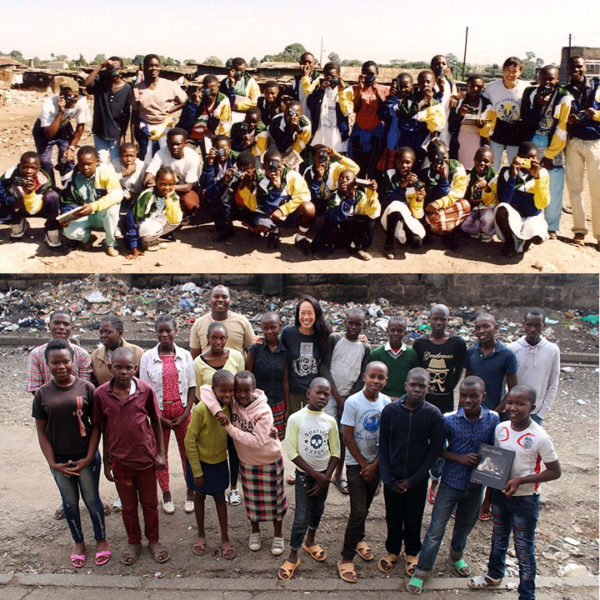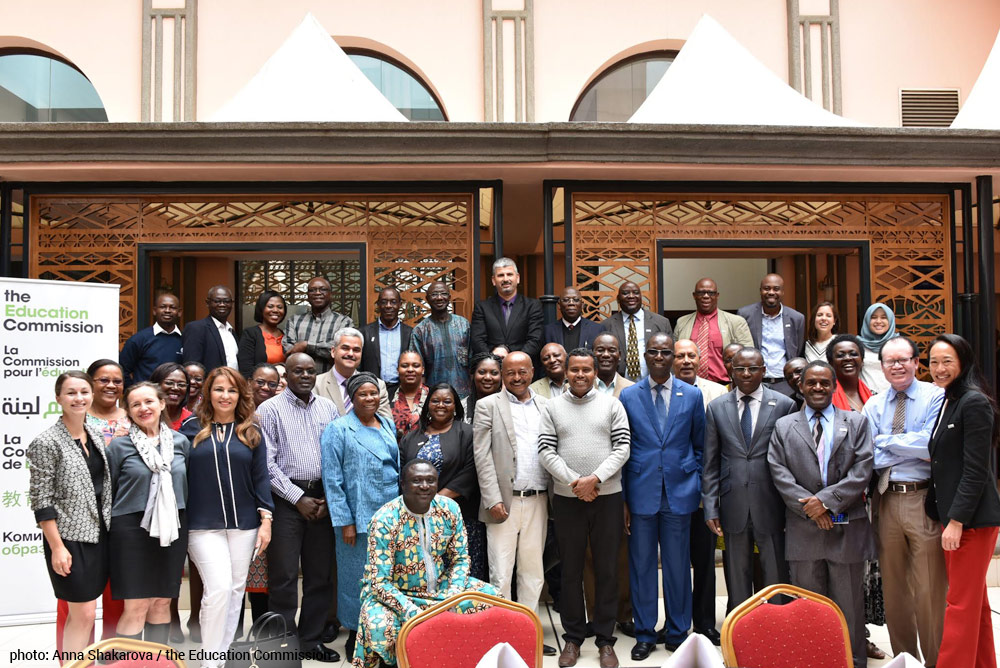Last week, I travelled to Nairobi to support our Learning Generation Lab Workshop. We brought together education leaders from twelve African countries to make real progress towards our shared education goals. This was an especially meaningful trip, as it was my first time back to Kenya since I lived there in the mid to late 90s.
Twenty years ago, I started a youth development project in Nairobi that empowered young people living in Mathare, one of Africa’s biggest slums, to tell their stories through photography and writing. The project resulted in the publication of Shootback: Photos by Kids from the Nairobi Slums, a documentary, a traveling exhibition, and inspired the creation of new NGOs dedicated to youth photo, film, and media training. Every week, Shootback took me down Juja Road’s cacophonous stretch of pot-holed chaos to dodge candy-colored matatus, skinny goats, and street hawkers to teach a group of 31 kids photography and writing. I’m proud that it continues to this day, under the auspices of a community development organization. Ten of my original students are now photographers and filmmakers, and one is a photographer for the United Nations who has created his own foundation to teach a new generation to use their creative voices to tell their stories.

In 1997, the author stands with the original Shootback cohort (photo: Alex Kamweru/Shootback). Twenty years on, the author joins students at the Mwelu Foundation, an initiative borne out of Shootback (photo: Maxwell Odhiambo/Mwelu Foundation).
In my return to Kenya, a central theme of our workshop – to listen and value people’s voices —resonated with my impetus to start Shootback years ago. The purpose of the Learning Generation Lab Workshop – a key step of the Commission’s Pioneer Country initiative – was to share the “delivery lab” methodology with education leaders from countries who are committed to reforming and investing in their education systems. Some 12 African countries participated, including high-level government officials and civil society representatives. Indeed, the workshop provided a platform for the exchange of ideas and knowledge for countries with a common cause. The agenda included a three-day simulation of the delivery lab process – a participatory tool that can help accelerate the delivery of reform priorities used to great effect in Malaysia and Tanzania. In practice, these labs create detailed implementation plans that lead to faster results and clearer accountability measures while upholding a core truth: everyone has a voice.
The workshop’s lab simulation gave participants a taste of the full six-week process that the delivery labs entail. To begin, the facilitators required a break in protocol as all ranks and titles were left at the door. All participants, be they Ministers or teachers, addressed each other by first name. This ground rule stripped away formality and quickly established an environment where everyone felt free to make their voices heard. The result? Heated debates over competing ideas which resulted in a shared plan with “ruthless prioritization” and painstaking delineation of detailed action items with task owners, completion dates, budget, monitoring, milestones, and the like. Amidst the serious work at hand, there were also good-natured jokes and full-throated laughter – the very camaraderie necessary to hasten inclusive progress.
The cross-cultural relationships established over the course of the five-day gathering were anything but accidental. Our aim was to bring people together – leaders, advocates, teachers, among others – and incubate the sharing of ideas and solutions to common, global challenges. An early success of the workshop is the creation of a network of education champions, ready to help drive change and improve education in their countries.
Participants left the workshop with an overview of what it takes to plan for the delivery labs, which are country-led and ideally last six weeks. The labs typically involve about 100 participants who contribute their perspective from every side of the education equation. For the delivery labs to be successful, key policymakers, budget planners, teachers, unions, parents, faith leaders, private sector, and civil society organizations all must be at the table. By design, all stakeholders have an equal voice in the lab process, and the resulting plan is a collaborative effort owned by all. The implementation plan is shared openly with the public to ensure full transparency and accountability.
With its emphasis on direct participation and inclusion of multiple voices in the process, the labs help to create a home-grown transformation and action plan that can spark genuine behavior change and new ways of doing business for faster and better results.
As the Shootback project demonstrated in a small but powerful way across the past two decades, when people are given a voice in the creation of a collective vision, the results can be transformative. After observing the lab simulation process in Nairobi, I am even more convinced that listening to multiple voices – from all sides and at all levels – is essential to achieving real results for our ultimate goal of ensuring every child’s right to an inclusive and quality education.
Lana Wong is the Commissioner Attaché at the Education Commission.


“Everyone has a voice”- such an important message. Thank you for sharing, Lana!
The Nairobi Learning Generation Lab workshop was indeed an eyeopener and especially the emphasis on inclusive participation in the planning for Education by all Stakeholders, this takes the words ownership and accountability to another level and of course the new word on the block ” Ruthless Prioritization”.
By the year 2030, more than half of the world’s 1.6 billion young people will never have been to school….
Well done Lana for keeping going with such important work. I hope you had a wonderful time meeting up with your Shootback team mates.
😉 x
Great work Lana!
Thank you so much for sharing.Very inspiring,indeed.We just need ears to hear the voices that are claiming quality education for all.No one us left behind.